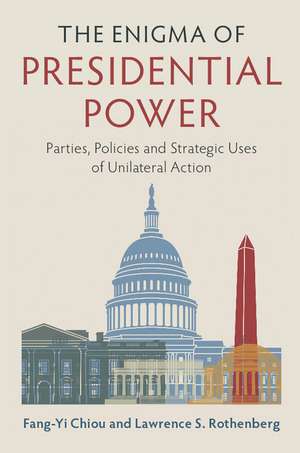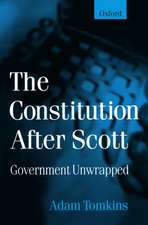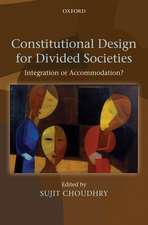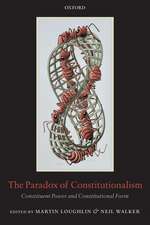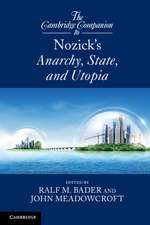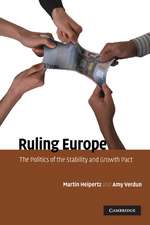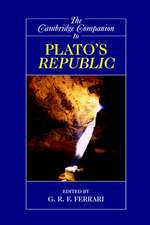The Enigma of Presidential Power: Parties, Policies and Strategic Uses of Unilateral Action
Autor Fang-Yi Chiou, Lawrence S. Rothenbergen Limba Engleză Paperback – 17 apr 2017
| Toate formatele și edițiile | Preț | Express |
|---|---|---|
| Paperback (1) | 177.01 lei 3-5 săpt. | +13.61 lei 4-10 zile |
| Cambridge University Press – 17 apr 2017 | 177.01 lei 3-5 săpt. | +13.61 lei 4-10 zile |
| Hardback (1) | 552.60 lei 6-8 săpt. | |
| Cambridge University Press – 17 apr 2017 | 552.60 lei 6-8 săpt. |
Preț: 177.01 lei
Nou
Puncte Express: 266
Preț estimativ în valută:
33.88€ • 35.27$ • 28.63£
33.88€ • 35.27$ • 28.63£
Carte disponibilă
Livrare economică 18 februarie-04 martie
Livrare express 01-07 februarie pentru 23.60 lei
Preluare comenzi: 021 569.72.76
Specificații
ISBN-13: 9781316642115
ISBN-10: 1316642119
Pagini: 242
Ilustrații: 27 b/w illus. 35 tables
Dimensiuni: 153 x 228 x 14 mm
Greutate: 0.35 kg
Editura: Cambridge University Press
Colecția Cambridge University Press
Locul publicării:New York, United States
ISBN-10: 1316642119
Pagini: 242
Ilustrații: 27 b/w illus. 35 tables
Dimensiuni: 153 x 228 x 14 mm
Greutate: 0.35 kg
Editura: Cambridge University Press
Colecția Cambridge University Press
Locul publicării:New York, United States
Cuprins
1. Introduction; 2. Thinking about power: theoretical models; 3. Not all unilateral actions are created equal: measuring the significance of executive orders; 4. The race for power: empirically examining competing models; 5. Bringing the parties in: legislative partisan influence and presidential power; 6. The subtleties of power - assessing the two presidencies; 7. Conclusions - solving the enigma of presidential power.
Recenzii
'Over the past two decades, few features of our Constitutional system have been scrutinized as thoroughly as the apparent rise of presidential powers that has accompanied the rise of the administrative state. But often times the arguments paint with too broad a brush - presidents are too powerful or they are too weak. Thus, Chiou and Rothenberg's nuanced account of the conditions for the successful exercise of presidential power will be an important contribution to this debate.' Nolan McCarty, Susan Dod Brown Professor of Politics and Public Affairs, Princeton University
'Theoretically informed empirical work is alive and well. Chiou and Rothenberg's models feature Congress countering presidential unilateral actions with tools that go well beyond the simple passage of a new law. Support for these models uncovers a robust system of checks and balances, with majority-party strength in Congress seriously constraining imperial instincts of presidents. Challenging past work, this book is a must-read for students of American political institutions.' Craig Volden, University of Virginia
'Chiou and Rothenberg combine exhaustive new data with impressively innovative methods to generate real insight. They have made a key contribution to our understanding of the significance of presidential unilateralism. It's a topic that will only become more central to the field, and more importantly to the country, in the years to come.' Andrew Rudalevige, Thomas Brackett Reed Professor of Government, Bowdoin College, Maine
'Theoretically informed empirical work is alive and well. Chiou and Rothenberg's models feature Congress countering presidential unilateral actions with tools that go well beyond the simple passage of a new law. Support for these models uncovers a robust system of checks and balances, with majority-party strength in Congress seriously constraining imperial instincts of presidents. Challenging past work, this book is a must-read for students of American political institutions.' Craig Volden, University of Virginia
'Chiou and Rothenberg combine exhaustive new data with impressively innovative methods to generate real insight. They have made a key contribution to our understanding of the significance of presidential unilateralism. It's a topic that will only become more central to the field, and more importantly to the country, in the years to come.' Andrew Rudalevige, Thomas Brackett Reed Professor of Government, Bowdoin College, Maine
Notă biografică
Descriere
Presidents are more constrained in exercising unilateral actions than before. This book asks: when does unilateral action correspond to presidential power?
